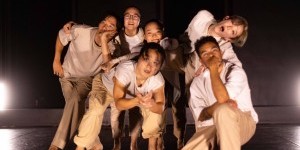AUDIENCE REVIEW: J CHEN PROECT Explores Theme of Identity in 11th Anniversary Concert

Company:
J CHEN PROJECT
Performance Date:
November 2, 2019
Freeform Review:
On November 2, 2019, J CHEN PROJECT, directed by Jessica Chen, presented their 2019 program. The show focused on the theme of identity, with pieces touching on how culture, societal labels, rituals, and relationships influence and shape identity. The concert featured nine pieces, including three world premieres by Jessica Chen and a world premiere by CORE Choreography Competition (C3) winner Michelle Thompson Ulerich.
Connected Fibers, a world premiere choreographed by Jessica Chen, opened the show with an exploration on the bonds that strengthen a community. The dancers huddled in a spotlight while their slow, connected movement mimicked the movement of the lungs. As dancers decumulated out of the huddle, a soloist’s thrashing motions contrasted with the smooth weight-sharing of the rest of the group. She seemed to be discerning where she fit in her society and the piece came to a satisfying conclusion when she was reabsorbed back into the huddle.
Climb. Is All We Know. was a solo originally choreographed by Nicole Smith and adapted and performed by Jessica Chen. Set to music by Bon Iver and a voiceover of prolific dancer and artistic director Desmond Richardson, the piece centered on the beauty of sharing the gift of dance. Chen’s movement, although minimalist, was intensely strong and controlled. Her gestures brought a raw and human feel to the performance, and she found fluidity in the holds and pauses throughout the piece. A motif in the voiceover was “Don’t worry about me, just do you”, and Chen took this quote to heart; her introspective yet captivating stage presence made it clear that dance is her identity.
The third piece, Unrelenting Worth, was a male solo choreographed by Jessica Chen. The dancer, Rafael Sanchez, hit strong, sharp, and sudden movements on the beats of the electronic music. The punching fists and clenching hands gave the impression that he was wrestling with an invisible struggle. Although this piece was short, it told the story without drawing it out unnecessarily.
Choreographed by Jessica Chen, First Words featured some of the most compelling and unique choreography of the program. The piece opened with two men draped over a female dancer in a gorgeous long red dress. The dancers repeatedly twitched and the female’s leg creeped out of the huddle until she escaped from under the men. First Words incorporated much body part manipulation, as the two men were holding onto the female’s extremities while she executed fluid and swirling choreography. The only drawbacks to this piece were that sometimes the dancers strayed from the lit parts of the stage and the ending seemed a bit abrupt.
Jessica Chen’s second world premiere of the night, Ecdysis, dealt with the masks and identities we accumulate and shed. The piece started a bit literally with the soloist, Erin Hicks, wearing a mask and a business-like suit. She stripped away the suit to reveal a flesh-colored unitard covered with labels like “she”, “child”, “shame”, and “kind”. As Hicks tore away the first costume, her movement transitioned from quick and linear to fluid. Then, she poured green, blue, and white paint over her face and limbs, and the choreography allowed her to explore the visceral feeling of the paint. This piece was very well-cast and enhanced by Hick’s expressiveness and clean technique and lines.
After intermission, the concert resumed with I Can Almost See You, a solo choreographed by Jessica Chen and inspired by the tradition Chinese folk dance from Dai Zu in China. This piece brought into discussion how culture affects and influences personal identity. An integral element to the choreography was a round straw hat which covered Jackie McCreavy’s face for most of the piece. McCreavy’s gorgeous technique and musicality was highlighted by the choreography as she deftly maneuvered the hat through swirling, flicking, and lunging motions. The cloudlike, ethereal, and circular movement flowed well together, and the hat was treated like an extension of the body. This piece was a bit too short; however, it left the audience gasping for more.
Woven Ritual was choreographed by the C3 winner, Michelle Thompson Ulerich, with an original score by Grace Villamil. The piece centered around how rituals alter lives and shape identities. A quick movement phrase with attitudes, penches, and lunges accumulated dancers and then they slowly walked forward as they moved their hands back and forth across their mouth. This melded into a series of interchanging duets and group sections, which Thompson Ulerich transitioned beautifully. Two standout moments were a male-male duet which swapped the role of the lifter very seamlessly, and a group partnering section where all the dancers were performing the same choreography but some of the dancers had a partner and others did not. The choreography was dynamic, undulating, and grounded and conveyed Thompson Ulerich’s theme very well.
Training the Devil, choreographed by Chen, was a portrait of a complex and sometimes problematic romantic relationship. Their power struggle was conveyed in a poignant way by having the dancers physically tied together as they pushed and reached for each other. Even after the wrist bindings were removed, the thrashing movement, shoulder initiation, and circling lifts conveyed that there were still some internal constraints in the relationship. This piece was greatly enhanced by the chemistry between the two dancers.
The concert ended with another Chen world premiere, And Then It Begins, a staunch work celebrating feminist trailblazers both past and present. The steampunk-esque costumes and David Stone Hamilton’s original post-apocalyptic score immediately drew the audience in. The group of female dancers moved in and out of a series of poses like a living sculpture. As the piece progressed, their movement transformed them into fierce fighters. However, the dancers’ performance quality and the slashing and punching choreography hinted that they were warriors not of their own volition, but because they had no choice but to fight for themselves. As the piece ended, they found their solace with long balances and slow, cohesive movement, signaling to the audience that there is hope on the horizon.
Chen’s choreography seemed tailor-made for each individual dancer, highlighting their strengths and camouflaging their weaknesses. As a result, her choreography looked very natural to her dancers’ bodies, refreshingly melding their unique movement styles with the choreography. Each of the pieces fit well with the theme and purpose of the concert, and nothing seemed incongruent or misplaced in terms of piece selection and choreography within. Chen’s masterful curation, paired with her clear and decisive choreographic voice, ensured a satisfying trajectory of the show. Their 2019 performance solidified J CHEN PROJECT’s status as a company on the rise in the NYC dance community.
Author:
Mariette Aungst
Photo Credit:
Vanessa Gonzalez-Bunster






